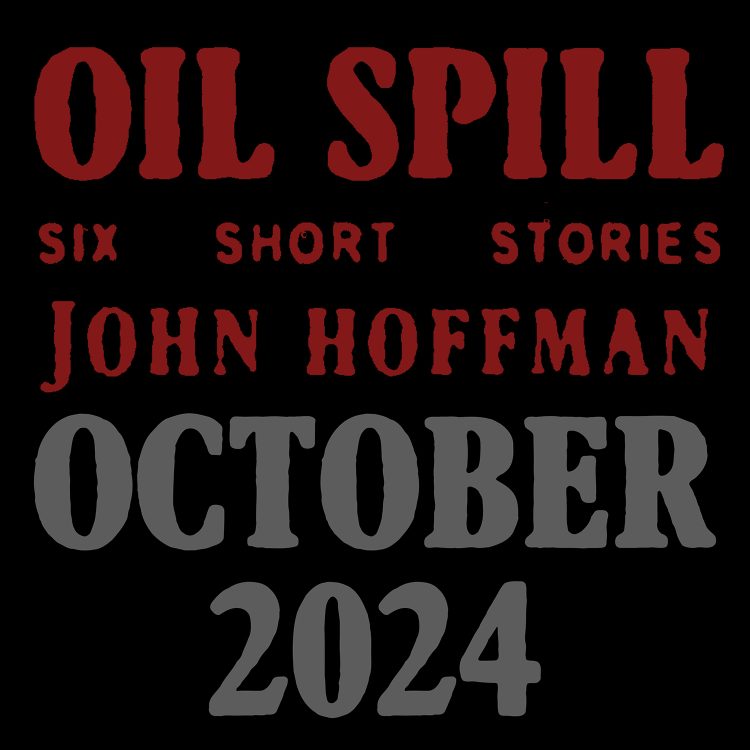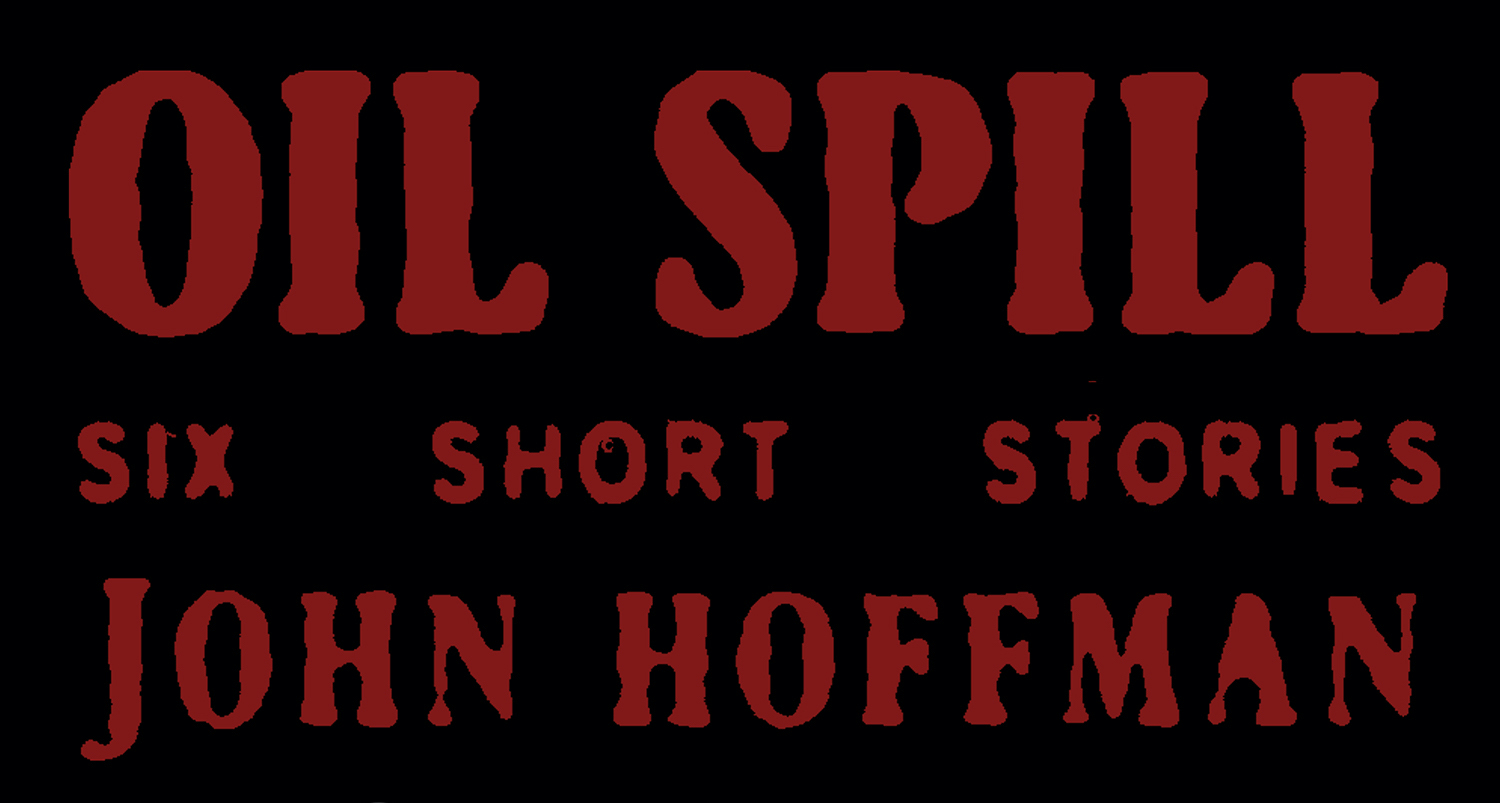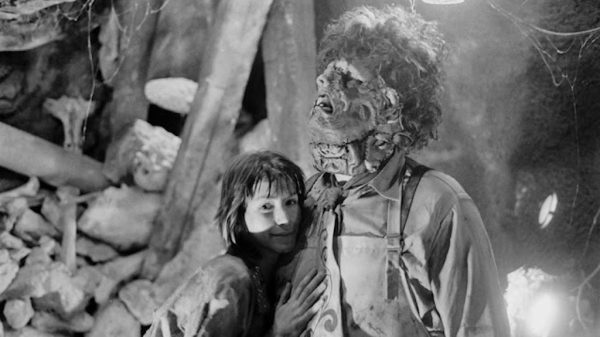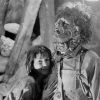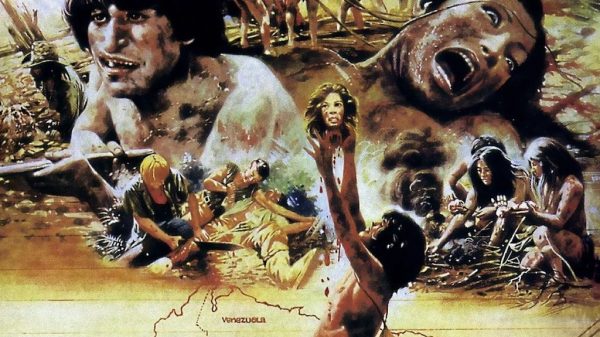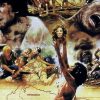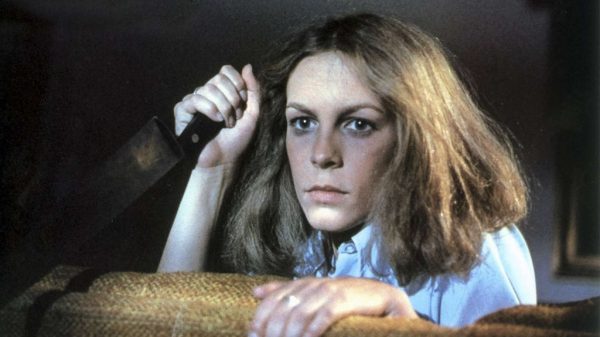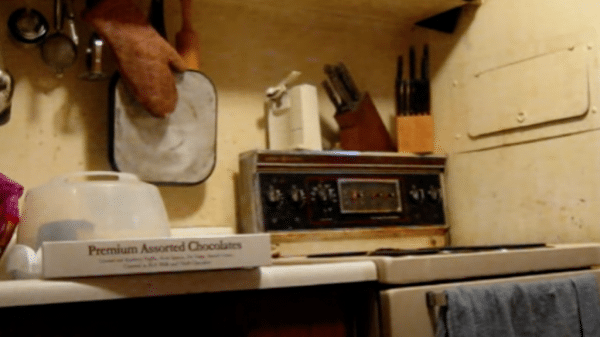Hardcore and metal have always trafficked in the darkness inherent in humans and the evil pervading the world. These genres, especially metal, have a sisterhood with literary genres like horror, suspense, and thriller, and it is surprisingly rare that the musicians that explore these themes sonically make the move from the stage to the page.
John Hoffman (Few and the Proud, Weekend Nachos, Spine, Ledge, Stomach, and more) has some literary predecessors–artists like Nick Cave, John Darnielle, and Henry Rollins–who have committed so seriously to their written art that the hyphen within musician-writer disappears, who may well be read by people who know nothing of their musical careers. That said, he may well be the first to dive so enthusiastically into the darker genres.
With a creative aptitude that belies his newness, and with a fluency that allows him to spring from subgenre to subgenre without missing a step, Hoffman’s premiere short story collection, Oil Spill, inspires legitimate comparisons to heavyweights like Dean Koontz, Dan Simmons, Shirley Jackson, and, perhaps most directly, Stephen King.
Having guested on The Lo Fi Horror Guy several times to discuss his favorite horror films, John Hoffman has demonstrated his affinity for and literacy with the horror genre in ways that the powerfully visceral and negatively charged themes of Weekend Nachos, Ledge, and Stomach have also alluded to for years. With these six stories exploring the supernatural and the realistic, the heart-wrenching and the perspiration-inducing, it is conceivable that, in a the foreseeable future, people will be reviewing film-adaptations of Hoffman’s own creations.
Fans of Hoffman’s decades-long career of musical brilliance as well as horror fans who’ve never dabbled in hardcore will equally find on display in these stories the work of a naturally gifted and hard working author, one whose affective and narrative gifts have only been hinted at until this gutpunch of a debut.
Keep an eye on Sifting Press for Oil Spill‘s October release date.

I wanted to start broad and talk about Sifting Press. Over the years, you’ve had these projects where you’ve started your own labels, like Bad Teeth, LSOH, and Sifting Press. Can you talk to me about your approach to doing these things yourself versus going through other channels?
Absolutely. I usually start off the traditional way—sending tapes out, sending manuscripts out—trying to impress someone enough to work with me. I always think, “OK, this is how I’ll go about it.” That’s what people traditionally do; it’s how people land a deal, right? But it never lasts very long. When I compare it to the job interview process, it’s so businesslike and dependent on someone else’s opinion that it exhausts me immediately. It makes me not want to go that route anymore. It also really kills my self-esteem and dignity. It shatters my opinion of myself, and I just decide at that point that I don’t want to subject myself to this way of working. So, the alternative is to use the resources I’ve accumulated over the years and the DIY ethics I’ve learned and literally do it myself.
That’s what has always led me forward. When Nachos started, I sent that demo around—mostly got ignored. A few people even said, “Fuck you.” That led to me and Nick starting Tooth Decay Records and putting out the seven-inch ourselves. And obviously, you see where that led us. We never would have thought Weekend Nachos would have been a band that people cared about, but that small step led to a giant level of success for me. Similarly with Spine, that all started with Bad Teeth recording. We built Spine into something that people enjoy and is recognizable to some degree. I did the whole thing where I sent my manuscript around for a bit. This was back when I had an entirely different novel written. I didn’t scrap it—I didn’t delete the file—but I didn’t do anything with it. I might revisit it someday, but it was just a novel loosely based on me and some weird people I knew in high school. I shopped it around and got rejection after rejection. It killed my momentum so severely.
When I started working on Oil Spill, the group of short stories, I kind of knew from the start that I wasn’t going to try too hard to get someone else to release it. I wrote it knowing I’d probably release it myself, and it’s freeing to know that’s the route you’re going to take.
I feel like that speaks to a long-standing zine culture and punk tradition of doing things for ourselves and our community. Do you find that, either in your music or now in your writing, the audience plays a role in your creative process?
That’s a very good question because once you start creating things, the only way to do anything beyond gratifying yourself is to get it out there and have an audience, right? So, I do think it plays an important part. Sharing and expressing yourself—if you’re just talking to a mirror, that can be peaceful, like writing in a journal or doing something that makes you feel good. But when it comes to art, sharing it is risky, but it’s also fun.
And seeing the response to it—it doesn’t always have to be a positive response. Just being able to share it and see what happens, you’re still doing it at the end of the day. When you develop a mentality that it doesn’t matter if people like it or not, but just that you’re putting yourself out there and risking the audience’s approval or disapproval, that’s a step beyond a personal hobby. So, the short answer would be embracing any type of reaction you may get. But the feeling of being able to express it to someone other than yourself is part of the excitement and enjoyment.
I’ve been thinking about hardcore, metal, and horror, and the relationship those genres have to one another. Partly because they are genres that, if you’re in it, become something we’re very emotionally tied to. But it’s also something that people who aren’t into it—family members, friends—can’t quite understand why it’s meaningful to us. It can seem frightening, alienating, or repulsive. Can you describe your relationship to horror? Maybe how it connects to hardcore or metal?
It’s funny you mention that because I got into horror at a very young age. I’m no expert on the genre, by the way. I’m always hopping around, but morbid hardcore has always appealed to me. Even from third grade, I was drawing gory pictures, obsessed with reading scary stories, and watching horror movies on TV. It spoke to me, I think. That’s something I need to figure out—why horror appealed to me at such a young age. It made the aggressiveness and morbidity of death metal, and the intensity of punk and hardcore, make more sense because I had already connected with something taboo. The real question is why I got into horror at 7 or 8 years old. What spoke to me about it? I think it might be the same kind of connection you form with something that isn’t mainstream or widely accepted.
I’m not a psychologist, but I’ve thought about this a lot, trying to analyze myself. I think it might have to do with feeling alienated or outcasted in other ways since childhood. Maybe it’s something like being ignored as a child, not getting along with your peers, or even something as simple as a disability that causes you to stand out from the crowd. You don’t feel like you have the same advantages as the “in” crowd. That might make a person gravitate toward something that, on the surface, doesn’t seem pleasant—like a horror film, where you’re watching people get their heads chopped off, or a hardcore song where someone is yelling, “Fuck you.” These are not traditionally pleasant things, but they resonate in a different way, and I think that might be why.
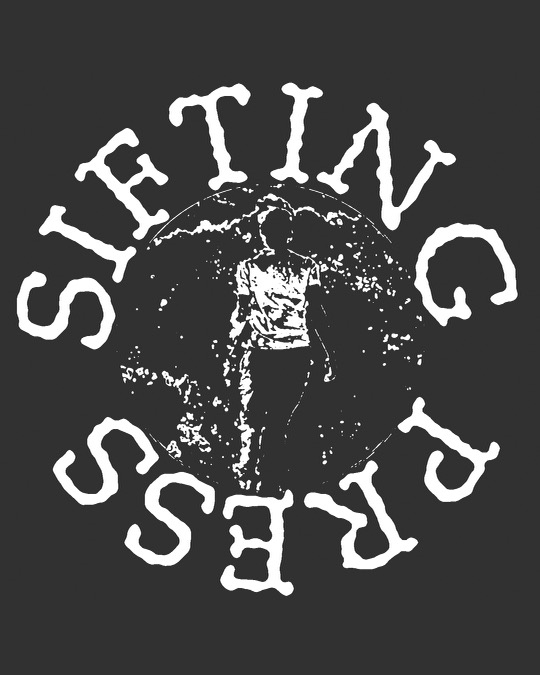
It’s funny you mention getting into it very early because your collection is dedicated to your daughter. I noticed a thread through the stories where youth plays a role in at least half of them, if not more. Is that something conscious, or do you feel there’s something specific about the role of children or innocence in your stories or in horror generally?
I think it’s both subconscious and conscious. There’s a natural tendency for me to gravitate toward stories told from a youth perspective. When I think about the atrocities of adulthood and what adults are capable of doing to each other in this world, it sounds bleak and dark, but I cling to my youth as a symbol of potential. Most people would agree that when you look at youth, you’re seeing the beginnings before things get messed up. You’re looking at where the potential lies for the world to be genuinely beautiful. If the world functioned the way childhood does—and I’m speaking of a privileged childhood, what anyone would want a child’s upbringing to be like—it would be different from how our society actually functions. When you look at government corruption, poverty, violence, racism—all of these prevalent issues—you don’t get that from youth.
Subconsciously, I think I’m clinging to that youthfulness in my writing. Consciously, I think it’s important to exemplify horror by subjecting youth to it. It’s impressionable, it’s brutal, and it has the most impact when someone innocent is subjected to something guilty. That’s a huge part of it—it really makes more of an impact.
When I think back to the six stories in Oil Spill, I’d agree that probably three out of the six are centered around a youth perspective, and the other three are more from an adult perspective. For the ones told from the perspective of youth, that was very much a conscious decision.
That brings me to another question I had in mind. You play a lot with point of view in these stories. With just six stories, we get to see you cover a lot of creative territory. So I have two questions about that variety. First, how do you determine point of view? In some stories, without spoiling anything, you take a very innocent perspective, while in others, you take a very “guilty” perspective from the point-of-view character. How do you make the decision on which point of view to take?
That’s a great question. I’d say it depends on what’s going to happen in the story. I’ll try to avoid spoilers, but in the title story Oil Spill, we have the perspective of a teenage boy who’s basically losing his mind. The story goes into more depth about why and how he’s losing his mind, but telling it from a teenager’s point of view aligns with the confusion of the teenage years. While the story is more drastic and fantastical, not really based in reality, it makes sense to tell it from that perspective because of the inherent confusion of that age.
In another story, one perspective is that of a very young child experiencing a broken home that he’s not used to from his own upbringing. I based that story directly on myself. Each point of view is chosen to match the nature of the story and the emotions or experiences the character is going through. I had a very strong family upbringing—it was solid. I based that story on a friend I made in third grade who had the complete opposite home life. I chose to embellish the atrocities of his home life with more supernatural elements to depict that. When I switch to an adult perspective, the situations are more aligned with what you might face as an adult. Yes, it might be unpleasant and confusing, but as an adult, you kind of sign up for it in a way. When you’re a kid, you don’t sign up to lose your mind or to suddenly discover that another kid’s life is horrible while yours is fine. As an adult, you’re more prepared to experience violence or toxicity. You’re just more ready to face the atrocities of the world. So, depending on the situation, I might shift the perspective to that of an adult.
This brings me to my other question about the diversity of subgenres or styles you’re playing with in these stories. I noticed you alternate between the fantastical and realism, which is a strength of a short story collection like this, where you can explore different approaches. Can you talk about how you decide whether to approach a story from a more fantastical or realist perspective?
Yeah, I’ve got ideas swirling around in my head all the time. Some of those ideas come from life experiences I want to capture in a story, either making them more messed up or depicting them exactly as they are. Other ideas stem from the fascination I had as a kid when I discovered monsters, werewolves, and vampires. So, to answer simply, it really just depends on what I feel like writing about at the time. But I do embrace that variety for a reason. Some of my writing is based on real-life terror, while some stems from the fantasy that consumed me as a kid. Sometimes I combine the two. I might take a situation I experienced as a child or as an adult and turn those real characters into something more fantastical. This approach not only creates a metaphor but also keeps the story interesting. Someone might read a story and see a vampire, while another person might recognize that the vampire represents an abusive father, for example. It’s my need for creativity just exploding.
You bring up some interesting questions I’ve often pondered about horror, the role of fantasy, and the supernatural. Vampires, for instance, appear in various forms in horror stories around the world—whether as Nosferatu, the Chupacabra, or something else. Do you think there are universal elements in horror that tap into something deep within each person, beyond cultural differences?
I’ll be honest, I think the human race has always been smart and creative. People started creating art a long time ago, and they were just as creative as we are now. I don’t think people have become more creative; there’s just different technology and social aspects that bring it out more. The origin of vampires in literature, for example, has always had a very sexual, predatory nature. A long time ago, someone might have decided that the concept of women being in danger in society—something terrifying and atrocious—could also create a compelling horror story. The character of a vampire exemplifies something that has existed in humanity for a very, very long time, possibly forever. I think that humans who wanted to be artistic have always been smart enough to embed deeper meanings behind their ideas. On the surface, something might just scare a child, but if you look deeper, it’s often people expressing their distaste for evil in the world.
Speaking of horror, I think about how it’s sometimes used to scare children, like in many folk tales. Stories like Hansel and Gretel are essentially warnings, telling kids not to wander off into the woods alone. A lot of these tales, while disguised as fairy tales, are pretty scary. They use the dangers of reality we already know to teach children right from wrong or safety versus danger. It’s just another example of creative humans finding a different way to teach important lessons.
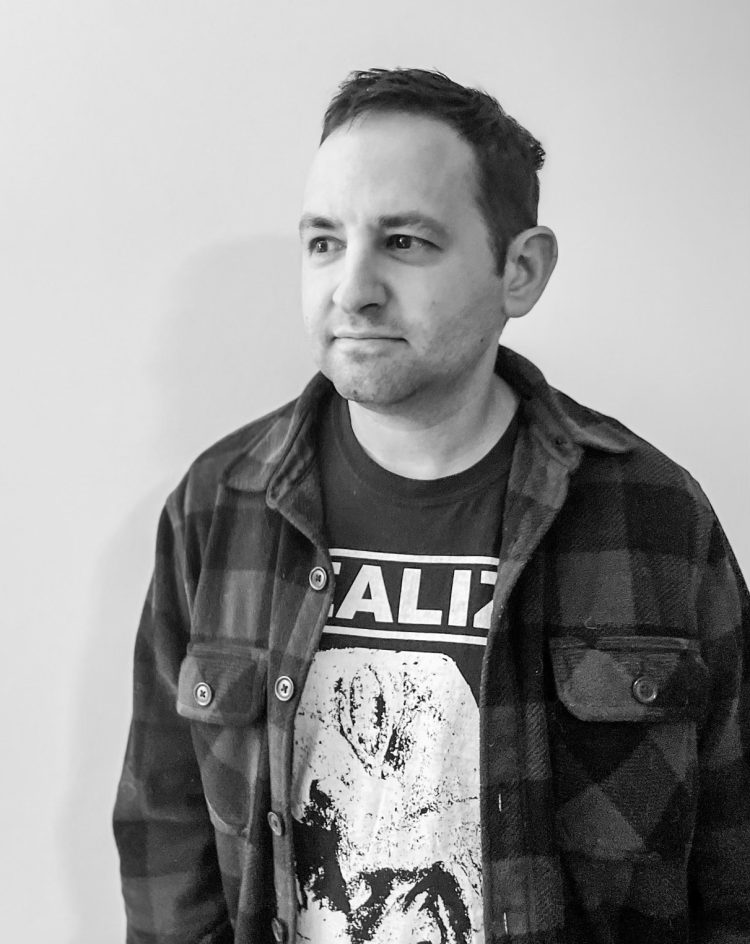
Exactly, and maybe it’s also about knowing that simply telling a kid, “Don’t go into the woods,” might create temptation rather than obedience. So, instead, creating a fearful object keeps them from doing something dangerous.
Yes, that’s a great example. The idea of children facing danger has inspired so many horror stories, many of which became fairy tales or vice versa. To bring this full circle, the concept behind Oil Spill, the collection of stories I’m about to release, is essentially taking the idea of the world being scary and connecting it to what we often see as just fiction.
I think that brings me back to your dedication and some of the things we’ve been discussing. Do you feel like fatherhood has influenced your relationship with horror and your creative process in writing horror?
That’s actually a really good question. Fatherhood has definitely made me smarter, though I’m not sure if it has directly influenced my relationship with horror. It has, however, helped me be more creative and a better writer. The challenge of parenting has pushed me to tap into my own thought process more and think outside the box. These skills I’ve developed as I strive to be a better parent have only enhanced my writing and made it more fulfilling.
Regarding your creative writing process, what makes a story scary for you? This touches on some larger concepts. I think about how horror can look very different depending on cultural context. For example, American adaptations of Japanese or Korean horror films often have different flavors. American films tend to use more jump scares, while Japanese films like Ringu might create a different kind of fear compared to their American counterparts like The Ring. What makes a story scary to you, especially if the goal is to create discomfort for your reader?
I think the idea of a lack of control is the most uncomfortable and potentially scariest thing a person can experience. When you strip away any sense of control from a situation, it often leads to fear. Many of the situations I’ve loathed in my life stem from feeling powerless. A good horror story typically involves a main character who is up against a problem that seems insurmountable or unfixable. If the character retains a sense of heroic control, the story might shift more towards an action narrative. But when control is lost, that’s what truly drives the horror. This realization is new to me, but it seems to be a core element of what makes a story genuinely unsettling.
I think you’re absolutely right. Even modern horror icons like Freddy, Jason, and Michael Myers can be seen as metaphors or symbols. They touch something deep inside us, perhaps connected to that lack of control you mentioned. This also ties into the prevalence of children and women as protagonists in horror. Often, you’ll see strapping male protagonists in horror movies, like in Saw, who are already physically compromised.
The Terminator is a great example of a sci-fi horror film that often gets categorized as action. It illustrates how genres can blend, with horror elements existing alongside action. It’s like an action film that sometimes gets lumped into the sci-fi horror genre. The appeal of both genres is evident because you have a protagonist who is essentially winning and losing at the same time. Kyle Reese, the main protagonist, is successful in saving Sarah Connor, but the film’s entire aura is filled with panic and a sense of nowhere to run. You don’t feel a sense of control at any point in the movie, except perhaps briefly, which is where the heroic aspect comes in. The reason it ties so closely to horror is that the Terminator, as an unstoppable and unbeatable villain, creates a bleak and inescapable situation, making the film uncomfortable from start to finish.
There are many things we don’t have power over, and this ties into the role of horror, which serves not only as entertainment but also as catharsis. What do you think? Is the role of horror in movies and books entertainment, catharsis, or both? Why?
I think it’s both. What makes it special, in a way that some mainstream people might not understand, is that it offers us a sense of understanding of what we don’t want to experience in life. Catharsis comes from figuring out what’s really going on in these processes we might not want to face. The horror genre forces us to confront things we don’t necessarily want to confront. The fact that it’s often embellished, fantastical, and sometimes ridiculous is what makes it turn an uncomfortable process into something manageable. You can sit by a fire on a cold night and read a horror story, feeling completely at peace even while being scared out of your wits, depending on the story. I think horror has a strong relationship with hardcore and punk because, like these genres, it provides a way to explore darker aspects of life. In contrast, attending a concert by The Moody Blues or Dave Matthews Band offers strictly comfort without a dark side. You know, it’s not really going to challenge you in certain ways. It’s easy and pleasant. The difference is that you can have a great time at a hardcore show, but you’re in a chaotic, potentially violent environment, exposed to negative outlooks in a positive way. A horror film can do the same thing. It doesn’t offer a peaceful experience; it doesn’t gently coast you through the next hour and a half. Instead, it challenges you and exposes you to aspects of yourself and your fears that you might not confront otherwise. Reading a children’s book or attending a pleasant concert, like an orchestra, doesn’t present the same level of challenge.
That’s perfect, and it brings so much of the discussion together. I guess the last thing I would ask is to turn that around a bit. Now that we’ve talked about what it means for a viewer, reader, or listener to have that kind of experience of catharsis and entertainment, what does it mean for you as a creator, writer, or performer to create and perform that for others? What does it do for you? Is it still catharsis and entertainment, or is it something else?
I’m not going to claim that I’m completely mentally sound at 41 years old. I still go to therapy and have a lot to learn and demons to face. But I think my purpose has shifted more into providing for others rather than doing it selfishly. For a long time, I’ve gained more enjoyment from seeing the effects that a band like Weekend Nachos has on its audience and hopefully the effect my writing has on its audience. At this point, I see it as using a gift I have to help others. I get satisfaction from seeing the full circle—what I once needed in life and how it benefited me. It honestly feels like giving back.
